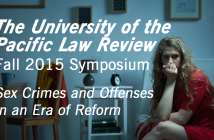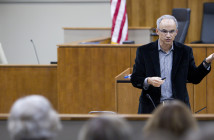Note: On Sept. 17, 2014, The Fair Political Practices Commission and the University of the Pacific, McGeorge School of Law Capital Center co-hosted a morning of spirited dialogue examining 40 years of political reform in California. The event featured prominent speakers discussing and debating the past, present, and future of the landmark 1974 initiative, the California Political Reform Act, that created the FPPC and made California a national leader in regulating campaign finance, conflicts of interest, and governmental ethics.
This article summarizes the panel “A Look Back at the Political Reform Act.”
John Burton, chair of the California Democratic Party and former assembly member and senator; Tom Houston, former chair of the Fair Political Practices Commission (FPPC); and Greg Lucas, California state librarian and former reporter, traded war stories and shared laughs regarding the early days of the FPPC and Political Reform Act during a symposium celebrating the Act’s 40th anniversary.
Before the Political Reform Act, Burton said politicians “could receive cash contributions in an envelope,” and money via other off-the-book methods.
Burton was a bartender prior to entering politics, so he always reciprocated when someone bought him a drink. He quickly learned lobbyists were upset he was “breaking down labor conditions.”
Things changed when Jerry Brown became Secretary of State. He was uncomfortable with campaign reporting methods, so worked with others to create an initiative for reform. The Watergate scandal became public just months before the Political Reform Act appeared on the ballot, which moved corruption to the top of voters’ minds.
“The public will always vote for political reform,” said Houston.
Lobbyists claimed the Act would put them out of business, according to Lucas. He read an anecdote from California Government and Politics Today, which said the “new FPPC tends to get bogged down in details.” The story suggested that if a legislator’s female Brittany Spaniel mated with a lobbyist’s male Brittany Spaniel, the FPPC would want to make sure any puppies were properly reported.
Houston sensed the unpopularity of the FPPC when he was appointed chair. Many told him that he would make lots of enemies, which he saw when he pushed for legislation to ban the personal use of campaign money. When Houston’s desired bill stalled, the Assembly passed a bill eliminating the FPPC chair’s income. The reform bill ultimately passed, and Houston did not lose his income.
“My philosophy on the FPPC has been you have to be very public” with reporting and investigating, said Houston. “You only report to God…I took full advantage and made enemies up and down the state.”
Not everyone with Capitol influence disliked the FPPC. As Burton explained, “the FPPC made lawyers rich.” He said now candidates will engage political lawyers as soon as they begin their campaigns, even before hiring a campaign manager.
The Political Reform Act has not been the only tool to reduce impropriety. Term limits helped curb undue influence, according to Lucas. He said it’s harder for lobbyists to become cozy with legislators when there is turnover every two to six years.
Burton insisted lobbyists have less influence over politicians today because of the strict gift limitations that mean a lobbyist can’t buy a hamburger for a politician. He doesn’t see this as a problem. “If you can’t buy your own goddamn hamburger, get [into]another business,” he said to audience laughter. But, he did admit to buying ice cream for FPPC chair Jodi Remke recently.
Houston said additional reforms are still needed. He pointed out that there are people he’d consider lobbyists who are not registered as such. In addition, companies seeking government contracts are exempt from lobbying restrictions, but they engage in de-facto lobbying to secure those contracts.





